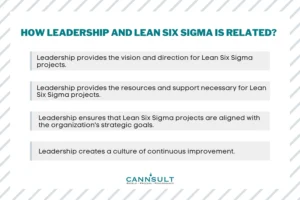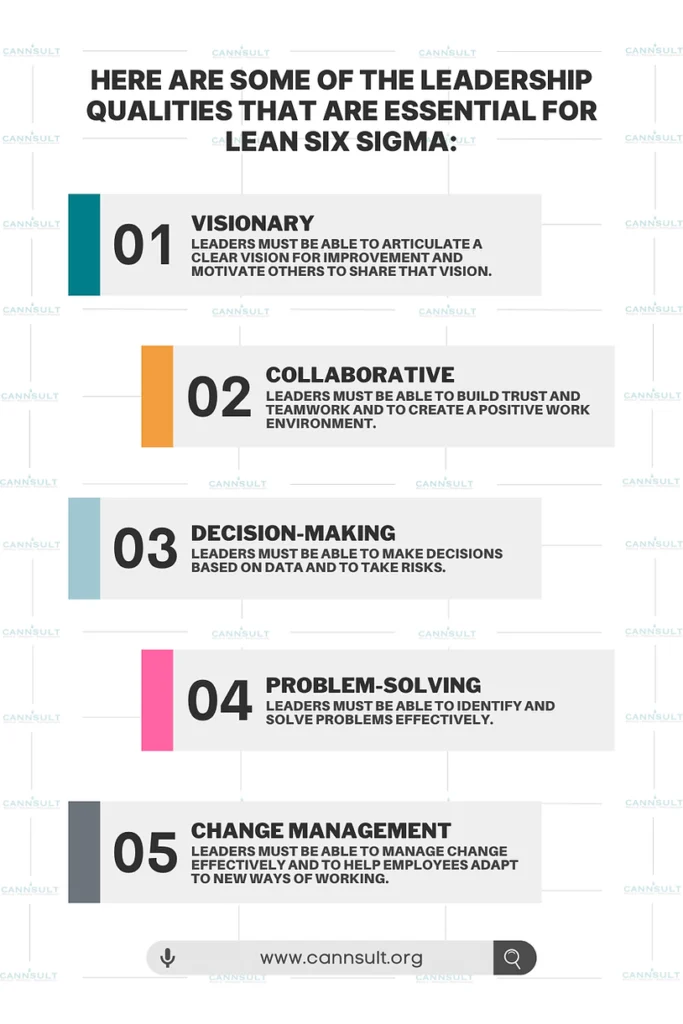In today’s rapidly evolving business landscape, effective leadership is crucial for driving organizational success and achieving sustainable growth. Leadership development programs have gained immense importance as they equip individuals with the necessary skills and mindset to navigate complex challenges and inspire teams toward achieving common goals. One approach that has gained significant recognition in recent years is the combination of Lean and Six Sigma methodologies. In this blog, we will explore the essence of leadership development and discuss how Lean and Six Sigma support and enhance the development of effective leaders.

Understanding Leadership Development
Leadership development is a comprehensive process that focuses on nurturing and enhancing the skills, abilities, and behaviors of individuals to become effective leaders. It encompasses various elements such as self-awareness, strategic thinking, communication, problem-solving, decision-making, and emotional intelligence. A successful leadership development program aims to identify and cultivate high-potential individuals, enhance their leadership competencies, and empower them to lead with integrity and influence.
Lean Philosophy and Leadership Development
Lean is a management philosophy derived from the Toyota Production System (TPS) and emphasizes the elimination of waste, continuous improvement, and respect for people. While Lean initially gained popularity in manufacturing, its principles have since been applied to various industries and functions, including leadership development. Here’s how Lean supports leadership development:
Respect for People
Lean places a strong emphasis on respecting and developing people at all levels of an organization. It fosters a culture of empowerment, trust, and collaboration, enabling leaders to build positive relationships, encourage employee engagement, and create a sense of ownership among team members.
Continuous Improvement
Leadership development is an ongoing journey, much like continuous improvement. Lean’s philosophy of Kaizen, which promotes the pursuit of small, incremental improvements, aligns with the idea of continuous learning and development. It encourages leaders to embrace a growth mindset, seek feedback, reflect on their actions, and continuously refine their leadership style.
Gemba Walks
The practice of Gemba walks, where leaders regularly go to the frontline to observe processes and engage with employees, is an essential Lean tool. By practicing Gemba walks, leaders can develop a deeper understanding of their team’s challenges, identify improvement opportunities, and strengthen their ability to lead by example.

Six Sigma Methodology and Leadership Development
Six Sigma is a data-driven methodology focused on reducing variation, improving process performance, and driving customer satisfaction. While traditionally associated with process improvement, Six Sigma principles and tools have valuable applications in leadership development:
Data-Driven Decision Making
Six Sigma emphasizes the use of data and statistical analysis to make informed decisions. Leaders who understand and apply Six Sigma principles can effectively analyze information, identify trends, and make data-driven decisions that lead to improved performance and desired outcomes.
DMAIC Framework
The DMAIC (Define, Measure, Analyze, Improve, Control) framework, a core component of Six Sigma, provides a systematic approach to problem-solving and process improvement. Leaders who are trained in the DMAIC methodology can apply the same structured thinking to address complex challenges and guide their teams through the problem-solving process.

Change Management
Six Sigma projects often involve organizational change, and effective change management is critical for successful implementation. Leaders who understand the principles of Six Sigma can better navigate change, communicate its purpose and benefits to their teams, and create a supportive environment for change adoption.
Integrating Lean and Six Sigma into Leadership Development
To fully leverage the potential of Lean and Six Sigma in leadership development, organizations can adopt the following strategies:
Training and Certification
Provide leaders with training in Lean and Six Sigma methodologies to equip them with the necessary tools and techniques for process improvement and data-driven decision-making. Professional certifications such as Lean Six Sigma Green Belt or Black Belt can enhance their credibility and expertise.
Projects and Application
Encourage leaders to engage in improvement projects that align with organizational goals. By actively participating in Lean and Six Sigma initiatives, leaders gain hands-on experience in problem-solving, change management, and process improvement, enhancing their leadership capabilities.
Mentoring and Coaching
Pair leaders with experienced Lean and Six Sigma practitioners who can guide and mentor them throughout their leadership development journey. These mentors can provide valuable insights, share best practices, and support leaders in applying Lean and Six Sigma principles to their leadership roles.

Benefits of Lean and Six Sigma in Leadership Development
Integrating Lean and Six Sigma principles into leadership development programs offers several benefits:
Improved Problem-Solving Skills
Leaders trained in Lean and Six Sigma develop a systematic approach to problem-solving, enabling them to address complex challenges effectively. They can identify root causes, analyze data, and make informed decisions that drive organizational improvement.
Enhanced Operational Excellence
By applying Lean and Six Sigma methodologies, leaders can optimize processes, eliminate waste, and enhance operational efficiency. This leads to improved productivity, reduced costs, and higher customer satisfaction.
Empowered and Engaged Teams
Lean and Six Sigma promote a culture of respect, empowerment, and collaboration. Leaders who embody these principles can foster a positive work environment, encourage employee engagement, and empower their teams to contribute to continuous improvement efforts.
Data-Driven Decision Making
Leaders equipped with Lean and Six Sigma knowledge can leverage data and analytics to make informed decisions. This helps minimize guesswork and subjectivity, leading to better outcomes and improved organizational performance.
Leadership development is a continuous process that plays a pivotal role in driving organizational success. By integrating Lean and Six Sigma principles and tools into leadership development programs, organizations can develop effective leaders who are adept at problem-solving, driving change, and creating a culture of continuous improvement. The combination of Lean and Six Sigma empowers leaders to make data-driven decisions, engage and empower their teams, and foster a culture of excellence. Investing in leadership development and leveraging Lean and Six Sigma methodologies is a powerful strategy for organizations aiming to thrive in today’s dynamic and competitive business landscape.









